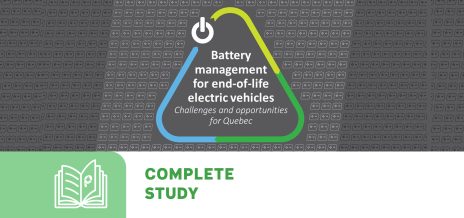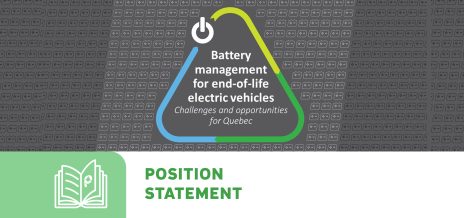Issues and best practices related to collecting and recycling end-of-life lithium-ion batteries
Propulsion Québec launches a study on the issues and best practices related to collecting and recycling end-of-life lithium-ion batteries in the transportation sector.
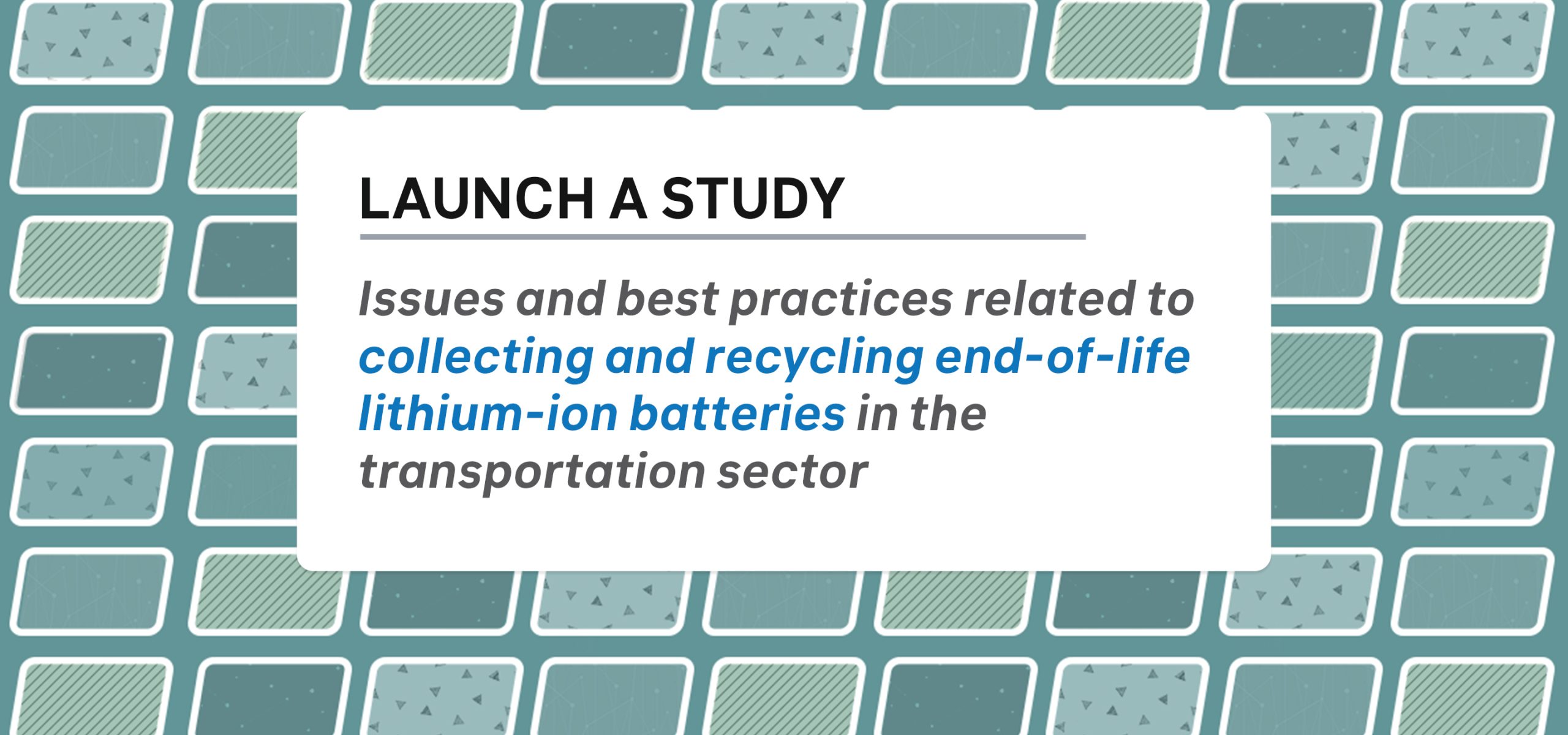
Montreal, February 13, 2020 — Propulsion Québec, the smart and electric vehicle cluster, has announced the launch of a study on the issues and best practices related to the implementation of an extended producer responsibility mechanism for end-of-life lithium-ion batteries in the transportation industry in Quebec and its surrounding markets.
The study objectives are:
- Consult stakeholders involved in lithium-ion battery end-of-life issues in the transportation industry;
- Present the legal framework that governs vehicles and electric vehicle batteries, as well as the collection and transportation of lithium-ion batteries in North America;
- Identify lessons that Quebec can learn from extended producer responsibility (EPR) mechanisms in place in other jurisdictions to facilitate the collection of lithium-ion batteries and increase recycling in the future;
- Present high-level authorities with an analysis of different roll-out strategies for an EPR mechanism that structures battery collection and recycling and explains the pros and cons.
A steering committee will work alongside EY, the firm conducting the study. Results will be published in Spring 2020.
Quotes
“The tremendous growth of the electric vehicle market will lead to a massive influx of end-of-life batteries in the next decade. The battery recycling market is both an interesting business opportunity and important issue, considering the potential end-of-life battery market that can be captured in Canada and the Northeastern United States. Given the current popularity of electric vehicles in Quebec, we want to see what is being done elsewhere and tackle this unavoidable issue head-on,” said Sarah Houde, CEO of Propulsion Québec.
“End-of-life batteries represent both an environmental challenge and an economic opportunity, given their potential for reuse. It’s a matter of striking the right balance between developing the electric transportation industry and ensuring the responsible and optimal management of end-of-life lithium-ion batteries. This study will allow us to work with stakeholders to reflect on what regulatory mechanism should be put in place,” she concluded.
The financial partners in the study are: the Ministère de l’Énergie et des Ressources naturelles, the Ministère de l’Environnement et de la Lutte contre les changements climatiques, RECYC-QUÉBEC, Call2Recycle, the Association of Auto Parts Recyclers, Hydro-Québec, Lithion Recycling, Nemaska Lithium, Nouveau Monde Graphite and Mason Graphite.
Continue reading on this subject

Critical and strategic minerals (CSM) traceability pilot project for the Quebec battery sector
PILOT PROJECT FOR QUEBEC’S BATTERY INDUSTRY A number of measures, regulations and laws are currently being put in place in certain countries to secure the local supply chain, or that of allied countries, in Critical and Strategic Minerals (CSM). Europe, for example, has announced the introduction of a Battery Passport from 2027, to track the […]
Read more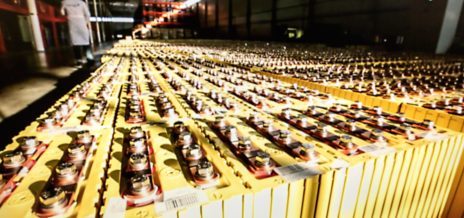
LITHIUM-ION BATTERIES : Local and international impact is on the horizon !
The lithium-ion battery sector is a key player in the future of electric and smart transportation in Quebec. Increasing announcements are highlighting the economic and environmental implications both locally and internationally.
Read more
Will industrial strategies chart a new course for the future of Quebec industries?
The Quebec economy—and more broadly the world economy—faces multiple challenges: the climate crisis, supply chain problems, labour shortages, inflation, etc. Quebec has an abundant supply of resources, know-how, and expertise; however, the next points on its agenda should include structuring, developing, and planning industrial activities.
Read more
Hosting a Charging Station?
The new Clean Fuel Regulations, SOR/2022-140, (the “Regulations”) aim to displace the use of fossil fuels and promote the use of electric and hydrogen fuel cell vehicles.
Read more
Ambition EST 2030 : a roadmap for propelling Quebec to the forefront of the electric and smart transportation industry by 2030
Propulsion Québec, the cluster for electric and smart transportation, is announcing Ambition EST 2030, a roadmap for the electric and smart transportation (EST) industry developed in partnership with Deloitte.
Read more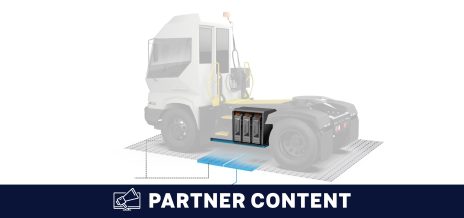
Less batteries, more autonomy: Revolutionizing the electrification of heavy-duty vocational trucks
Effenco recently launched a new, 100% electric solution that is poised to radically transform the vocational trucking sector, one of the most polluting sectors of the transportation industry.
Read more
Québec on its way to homegrown battery industry
Québec is well positioned to lead the way in lithium battery manufacturing and ramp up the transition to electric transportation.
Read more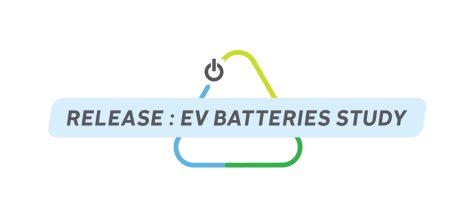
Propulsion Québec releases a new study on extended producer responsibility for end-of-life electric vehicle battery management
Propulsion Québec smart and electric vehicle cluster today released a brand new study entitled Extended Producer Responsibility for Electric Vehicle Lithium-Ion Batteries in Quebec.
Read more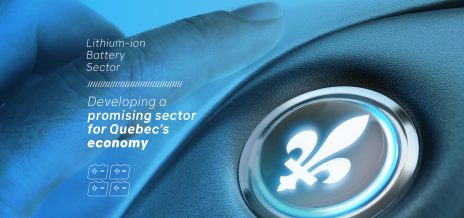
Lithium-Ion Battery Industry: Propulsion Québec Releases Study Confirming Huge Potential for Quebec
Propulsion Québec has released a study revealing the enormous potential of the lithium-ion battery industry in Quebec. The study, carried out by KPMG, looks at global markets for lithium-ion batteries and end-of-life battery recycling, and offers recommendations on how to grow those strategic sectors in Quebec.
Read more
